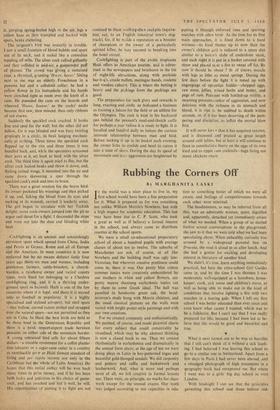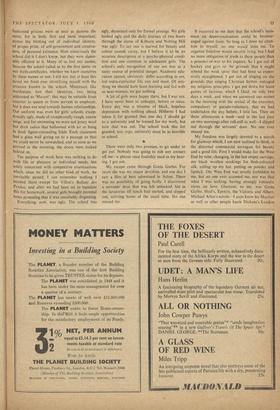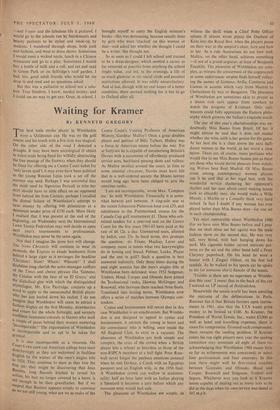Rubbing the Corners Off B y MARGHANITA LASKI r the world
was a nicer place to live in, my I first school would have been a fine preparation for it. What it prepared us for was something not unlike William Morris's Nowhere, but with a high respect for academic education. This last may have been due to C. P. Scott, who took a great as well as (I believe) a formal interest in the school, and always came to distribute rosettes at the school sports.
We were a small co-educational preparatory school of about a hundred pupils with average classes of about ten to twelve. The suburbs of Manchester are not, of course, at all like Nowhere and the building itself was ugly late- Victorian, but wherever creative prettiness could come in, there it was. Our pretty blue cotton summer tunics were creatively embroidered by our mothers in white and yellow flowers, our pretty mauve shantung eurhythmic tunics cut by them to some Greek ideal. The hall was panelled in handsome green oak, the head- mistress's study hung with Morris chintzes, and the usual classical pictures on the walls were varied with bright poster-style paintings and with our own creations.
For we created constantly and enthusiastically. We painted, of course, and made pictorial charts for every subject that could conceivably be visualised, which may be why abstract thinking is now a closed book to me. Then we created rhythmically in eurhythmics and dramatically in the annual form plays; at the age of ten we were doing plays in Latin in key-patterned togas and beautiful gold-thonged sandals. We did carpentry and pottery and raffia and basketwork and leatherwork. And, what is more and perhaps most of all, we felt creative in formal lessons too. There were, on principle, no marks for class- work except for the annual exams. Our work was judged according to our capacities in rela- tion to something better of which we were all aware, and feelings of competitiveness towards each other were minimal.
The headmistress, as may be inferred from all this, was an admirable woman, quiet, dignified and, apparently, detached yet immediately aware of what we needed. When a group of us started furtive sexual conversations in the playground, she saw to it that we were told what we had been speculating about. When unhealthy curiosity was aroused by a widespread parental ban on Dracula, she read it aloud to us after lunch. And she had a genius for exciting and developing interest in literature of another kind.
We didn't, it's true, learn anything immediately practical, but here the extra-school Girl Guides came in, and by the time I was thirteen I was moderately well-equipped as a laundress, house- keeper, cook, sick nurse and children's nurse, as well as being able to make out in the kind of conditions that involve lighting a fire with two matches in a tearing gale. When I left my first school I was better educated than ever since and even knew what career I wanted, which was to be a folklorist. But I can't say that I was really prepared for life, because I had been led to be- lieve that life would be good and beautiful and true.
• * What it next turned out to be was so horrible that I still can't think of it without a sick loath- ing. I had believed I was leaving this school to go to a similar one in Switzerland. Apart from a few days in Paris I had never been abroad, and a srhudged photograph of high mountains in a geography book had enraptured me. But where I went was to a girls' big day school in west London.
With hindsight I can see that the principles governing this school and those behind old- fashioned prisons were as near as damme the same, for in both, first and most important, comes the blotting out of individual identity, of proper pride, of self-government and creative- ness, of personal existence. How consciously the school did it I don't knoyv, but they were damn- ably efficient at it. Many of us lost our names, because the school called us by the first name on our birth-certificates, whether we knew ourselves by these names or not; I did not. but at least this saved me from ever identifying myself with the creature known to the school. Mistresses, like wardresses, lost their identities, too, being addressed as 'Ma-am'; this may be suitable from courtier to queen or from servant to employer, but it does not tend towards human relationships. Our uniform was, even for girls' schools, excep- tionally ugly, made of exceptionally rough, coarse serge, and for swimming we wore not jersey wool but thick calico that ballooned with air or hung in dank figure-concealing folds. Each classroom had a glass wall giving on to a passage so that we could never be unwatched, and as soon as we arrived in the morning, the doors were locked behind us.
The purpose of work here was nothing to do with life or pleasure or individual needs, but solely concerned with competitive examinations Which, since we did no other kind of work, we inevitably passed. I can remember nothing I learned there except for Villon's Ballade des Pendus, and after we had been set to translate this for homework, several girls brought parental notes protesting that it was unsuitably disgusting.
Everything, now, was ugly. The school was ugly, decorated only for formal prestige. We girls looked ugly and the daily journey of two hours through the slums of Kilburn and Notting Hill was ugly. To say one is starved for beauty and colour sounds corny, but I believe it to be an accurate description of a psycho-physical condi- tion and one common in adolescent girls. The, school's only recognition of our sex was as a nasty source of potential danger. Academic edu- cation cannot, obviously differ according to sex, but extra-curricular life can and must. Of any- thing we should have been learning and fed with as near-women, we got nothing.
A lot of girls were happy there, but I was not. 1 have never been so unhappy, before or since. Every day was a miasma of black, hopeless depression with nothing ahead. Hitherto I had taken it for granted that one day I should go to a university and be trained for my work, but now that was out. The school took this for granted, too; ergo, university must be as horrible as school.
There were only two avenues, to go under or get out. Nobody was going to rub any corners off me—a phrase once foolishly used in my hear- ing. I got out.
My escape came through Greta Garbo. For years she was my major devotion, and one day I saw a film of hers advertised in Acton. There was no possibility of going licitly. I discovered a servants' door that was left unlocked, hid in the lavatories till lunch had started, and slipped out, arriving home at the usual time. No one missed me. It occurred to me then that the school's insis- tence on depersonalisation could be boomer- anged against them. So long as 1 drew no atten- tion to myself, no one would miss me. To organise freedom would involve lying, but 1 had no more obligation of truth to these people than a prisoner-of-war to his captors. So I got out of hockey and gym on the grounds that it might rebend the weak spine that had been so expen- sively straightened. I got out of singing on the grounds that singing Christian hymns outraged my religious principles. 1 got put down for team games of lacrosse, which I liked, on only two days a week, and when we answered our names in the morning with the recital of the exercises, compulsory or pseudo-voluntary, that we had undertaken the day before, I told lies. Then on three afternoons a week—and in the last year on two mornings after roll-call as well—I slipped out through the servants'' door. No one ever missed me.
My freedom was largely devoted to a search for glamour which, I am now inclined to think, is the distorted commercial surrogate for beauty and a good life. First I would make for the West End by tube, changing, in the last empty carriage, my black woollen stockings for flesh-coloured silk, rolling up my hat. putting on powder and lipstick. The West End was strictly forbidden to me, but no one ever accosted me, nor was that what I was seeking, having strongly romantic views on love. Glamour, to me, was Greta Garbo, Heal's, Epstein, the Victoria and Albert, Michael Arlen's novels—1 soon knew his Mayfair as well as other people know Dickens's London —and Vogue and the fabulous life it pictured. I would go to the schools run by hairdressers and beauty parlours to be styled and made-up by students. I wandered through shops, both junk and fashion, and went to dress shows. Sometimes I would meet a wicked uncle, lunch in a Chinese restaurant and go to a play. Sometimes 1 would buy a bottle of milk and a roll, and eat and read in Green Park or on Selfridge's roof garden. 1 had. too, good adult friends who would let me drop in and read and no questions asked.
But this was a palliative to school not a solu- tion. True freedom, I knew, needed money, and I could see no way to get any. Once, at school, I brought myself to carry the English mistress's books—this was demeaning, because usually done by girls who were 'cracked' on this woman or that—and asked her whether she thought I could be a writer. She thought not.
So as soon as I could I left school and trained to be a dress-designer, which seemed a career as far removed as possible from anything the school might value, and led, in the evenings, a life of as much glamour as my social circle and parental restrictions allowed. It was oddly unsatisfactory. And at last, though with no real hopes of a better condition, there seemed nothing for it but to go to Oxford after all.




























































 Previous page
Previous page